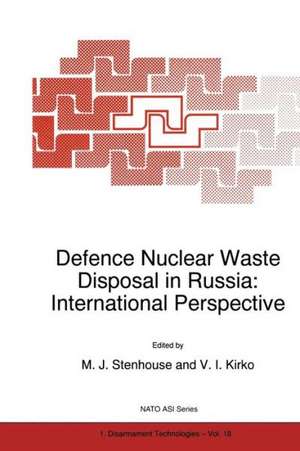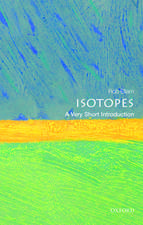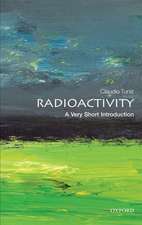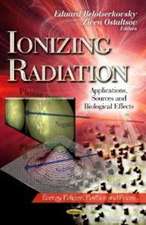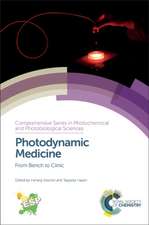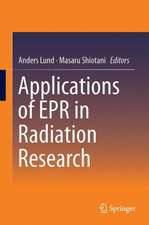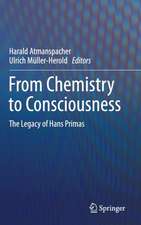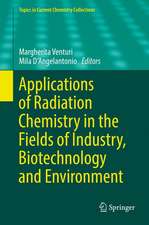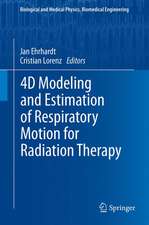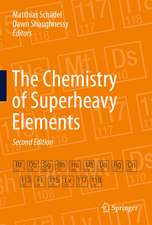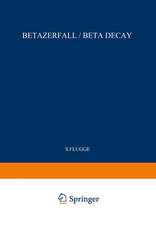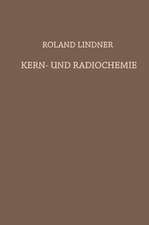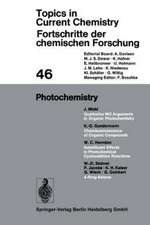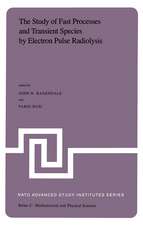Defence Nuclear Waste Disposal in Russia: International Perspective: NATO Science Partnership Subseries: 1, cartea 18
Editat de M.J. Stenhouse, Vladimir I. Kirkoen Limba Engleză Paperback – 11 oct 2012
The book provides a good insight into ongoing research at local and national level within Russia, devoted to the safe disposal of defence-related radioactive waste. It also demonstrates how existing expertise and technology from civilian nuclear waste management programmes can be applied to solving the problems created by nuclear defence programmes.
Contributions address methods of immobilisation, site selection methodology, site characterisation techniques and data interpretation, the key elements of safety/performance assessments of planned deep (geological) repositories for radioactive waste, and radionuclide transport modelling. Concerns associated with certain specific nuclear waste disposal concepts and repository sites are also presented.
| Toate formatele și edițiile | Preț | Express |
|---|---|---|
| Paperback (2) | 1052.85 lei 39-44 zile | |
| SPRINGER NETHERLANDS – 30 iun 1998 | 1052.85 lei 39-44 zile | |
| SPRINGER NETHERLANDS – 11 oct 2012 | 1220.26 lei 6-8 săpt. |
Din seria NATO Science Partnership Subseries: 1
- 15%
 Preț: 643.65 lei
Preț: 643.65 lei - 18%
 Preț: 949.23 lei
Preț: 949.23 lei - 18%
 Preț: 951.14 lei
Preț: 951.14 lei - 18%
 Preț: 950.96 lei
Preț: 950.96 lei - 18%
 Preț: 1226.42 lei
Preț: 1226.42 lei -
 Preț: 392.97 lei
Preț: 392.97 lei - 18%
 Preț: 944.36 lei
Preț: 944.36 lei - 18%
 Preț: 1227.04 lei
Preț: 1227.04 lei - 18%
 Preț: 947.35 lei
Preț: 947.35 lei - 18%
 Preț: 952.09 lei
Preț: 952.09 lei - 18%
 Preț: 955.56 lei
Preț: 955.56 lei - 15%
 Preț: 643.65 lei
Preț: 643.65 lei - 18%
 Preț: 947.67 lei
Preț: 947.67 lei - 18%
 Preț: 1111.97 lei
Preț: 1111.97 lei - 18%
 Preț: 1230.66 lei
Preț: 1230.66 lei - 5%
 Preț: 2125.27 lei
Preț: 2125.27 lei - 15%
 Preț: 650.86 lei
Preț: 650.86 lei - 18%
 Preț: 949.23 lei
Preț: 949.23 lei - 15%
 Preț: 640.37 lei
Preț: 640.37 lei - 15%
 Preț: 650.37 lei
Preț: 650.37 lei - 18%
 Preț: 1225.16 lei
Preț: 1225.16 lei -
 Preț: 391.40 lei
Preț: 391.40 lei - 18%
 Preț: 945.14 lei
Preț: 945.14 lei - 5%
 Preț: 1407.87 lei
Preț: 1407.87 lei -
 Preț: 398.15 lei
Preț: 398.15 lei -
 Preț: 390.46 lei
Preț: 390.46 lei
Preț: 1220.26 lei
Preț vechi: 1488.12 lei
-18% Nou
Puncte Express: 1830
Preț estimativ în valută:
233.50€ • 243.31$ • 193.33£
233.50€ • 243.31$ • 193.33£
Carte tipărită la comandă
Livrare economică 03-17 aprilie
Preluare comenzi: 021 569.72.76
Specificații
ISBN-13: 9789401061483
ISBN-10: 9401061483
Pagini: 368
Ilustrații: XXI, 340 p.
Dimensiuni: 160 x 240 x 19 mm
Greutate: 0.52 kg
Ediția:1998
Editura: SPRINGER NETHERLANDS
Colecția Springer
Seria NATO Science Partnership Subseries: 1
Locul publicării:Dordrecht, Netherlands
ISBN-10: 9401061483
Pagini: 368
Ilustrații: XXI, 340 p.
Dimensiuni: 160 x 240 x 19 mm
Greutate: 0.52 kg
Ediția:1998
Editura: SPRINGER NETHERLANDS
Colecția Springer
Seria NATO Science Partnership Subseries: 1
Locul publicării:Dordrecht, Netherlands
Public țintă
ResearchCuprins
Introductory.- 1 The Role of Performance Assessment in Radioactive Waste Disposal.- Session 1: Waste Conditioning & Engineered Barriers.- 2 Multibarrier Effectiveness as the Expedient Measure for Selecting the Appropriate Stabilization and Immobilization Procedure for the Various Waste Categories.- 3 Disposal of Conditioned HLW Matrices and Interaction with a Deep Clay Layer as Host Formation.- 4 Waste Conditioning Methods: Economical and Ecological Impact.- 5 A Search for Optimal Forms for Solidifying High-Level Radioactive Waste which are Geologically Compatible with Granitic Host Rocks.- 6 Caesium Immobilization using Zeolite-Containing Rocks and High Temperature Treatment.- 7 Use of Natural Materials from Northern Russia for the Isolation of Radioactive Wastes and Spent Nuclear Fuel.- Session 2: Geological Aspects of Radioactive Waste Disposal.- 8 Geological Aspects of the Deep Disposal of Radioactive Waste.- 9 Geological Formations in Bulgaria Suitable for a Deep HLW Repository.- 10 Complex Geological Investigations to Select a Site for High-Level Waste Disposal in the Krasnoyarsk Region (Russia).- 11 On the Question of Predicting the Safety of the Northern ‘Polygon’ of the Krasnoyarsk Mining-Chemical Company Based on a Geological and Geophysical Model.- Session 3: Site Characterisation Methods.- 12 Site Characterisation Methods and Data Interpretation — the Drigg Site Characterisation.- 13 Application of Focusing Transformations to Environmental Geophysical Problems.- 14 Acoustic Emission Monitoring: a Tool for the Selection and Nondestructive Characterisation of Sites for the Deep Disposal of Radioactive Waste.- 15 Kinetic Concept of Monitoring the Long-Term Stability of a Deep Repository for Radioactive Waste.- Session 4: Modelling/Assessment Associatedwith Radioactive Waste Disposal.- 16 Identifying Contaminants of Concern for Postclosure Assessment.- 17 Experience of Safety Assessment for the Deep Disposal of Intermediate-Level Waste in the U.K..- 18 Deep-Well Injection of Liquid Radioactive Waste in Russia: Present Situation.- 19 Deep-Well Injection of Radioactive Waste in Russia.- 20 Probabilistic Safety Assessment for High-Level Waste Tanks at Hanford.- Session 5: Special Problems Associated with Radioactive Waste Disposal.- 21 Underground Autocatalytic-Criticality Potential and its Implications to Weapons Fissile-Material Disposition.- 22 Geological History of Yucca Mountain (Nevada) and the Problem of a High-Level Nuclear Waste Repository.- 23 Chemical Aspects Associated with the Assessment of Radionuclide Migration through Natural Geochemical Barriers.- 24 Application of Biotechnology to the Problem of the Disposal of Radioactive Wastes.- 25 Evaluation of the Safe Disposal of Radioactive Waste and Spent Fuel in the Vicinity of Bashmachnaya Bay on the Novaya Zemlya Archipelago.- 26 Comments on Seismic Considerations with Respect to Deep Radioactive Waste Disposal.- Summary of Workshop Discussions.
